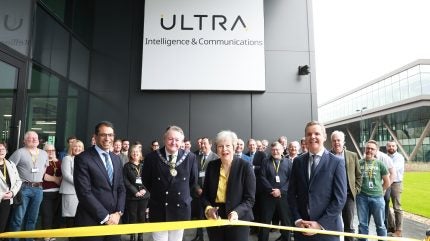
Step into Maidenhead, where Ultra Intelligence & Communications’ facility supports 250 high-tech engineering jobs and provides communication solutions for the UK, NATO, and the Five Eyes alliance.
Ultra Intelligence & Communications (Ultra I&C) has inaugurated its Cyber Centre of Excellence in Maidenhead, representing an investment of £30m ($37.8m) spanning 56,000ft². The facility, housing 250 engineers, aims to enhance cybersecurity resilience in the UK while fostering STEM talent.
Richard Dingley, President of Ultra I&C’s cyber business, and Simon Croall, Vice President of BD & Innovation, stress the centre’s importance in long-term skill development to safeguard the nation and its partners. Former UK Prime Minister Theresa May commended the initiative for nurturing STEM careers and enhancing the country’s resilience against cyber threats.
Harry McNeil (HM): Could you provide an overview of Ultra Intelligence & Communications’, Cyber Center of Excellence, and its significance in Maidenhead and the UK?
Richard Dingley (RD): The facility in Maidenhead serves as a hub for a broad range of work in engineering, from research and production to development. It supports 250 high-tech engineering jobs here in this facility, opens us up to the Thames Valley in terms of the catchment area market, and provides a world-class modern facility for people to work in. We moved from a site that probably wasn’t fit for a technology company for the next generation, but where we are now, we’re ready to support that national security mission and our customer’s mission.
(HM): What specific areas of cybersecurity and manufacturing does the Cyber Centre of Excellence focus on?
(RD): Ultra Intelligence and Communications, specialises in secure communications for our customers, including the UK, NATO, and the Five Eyes alliance. Our focus spans software, hardware, and firmware to ensure security solutions.
(HM): How does the opening of the Cyber Centre align with Ultra I&C’s strategic goals and vision for the future?
(RD): We need to be in a facility suitable for supporting those high-tech engineering jobs in the future by providing the necessary infrastructure and environment. How does it support us? It ensures we can attract and retain people.
Simon Croall (SC): The building enables collaborative working.
(HM): I’ve seen that 250 high-skilled roles will be created. Can you elaborate on Ultra I&C’s role in supporting the development of these high-end skills in the UK?
(RD): We invest in STEM and outreach through programmes such as the National Cybersecurity Center’s CyberFirst scheme, so we take on some of those people every year. We also have summer placement schemes and professional development opportunities. Again, we’re trying to make working in this sector attractive and motivational.
(HM): I heard GCAP was mentioned earlier. What opportunities does the Cyber Centre of Excellence present for collaboration with the UK Government and allied nations in defence and national security?
(RD): Its scale could support large-scale programmes in the future, such as GCAP and other programmes across NATO. You have AUKUS as well, where Pillar II, in particular, will demand cyber capability.
(SC): Partnership is at the core of what we do. We had people from BAE Systems and Northrop Grumman in the audience, and others, and most of our Government department customers were represented. Having this visible Centre of Excellence enables us to attract and collaborate with partners to develop the capability that the UK and our allies need.
(RD): You also had many other UK defence and technology companies here today, from the big UK and international primes through to SMEs. It’s not just Ultra delivering capability organically; we work with the UK defence industry and international as well.
(HM): Can you share any insights into Ultra’s I&C’s future plans and initiatives related to cybersecurity and its commitment to supporting national security missions?
(RD): There’s the facility itself and that huge commitment, the £30m investment in the facility we’ve got here. I think some of the demos that you’ve seen today also show how we’re transferring some of our approaches to be more software-based and software-updated. So it’s a change from a technology perspective from Legacy monolithic hardware to software-defined, secure communications of the future.
(SC): I think it’s fair to say that Advent International have been superb because when they acquired Ultra in August 2022, they worked with the UK Government to secure that UK engineering capability, which means it’s something that we can build on. From that core of Engineers, we can then move on to new programmes. Without the investment from Advent and the support of the UK government, we wouldn’t have the capability that we have included in this fantastic building.
(HM): Thank you very much, gentleman.




